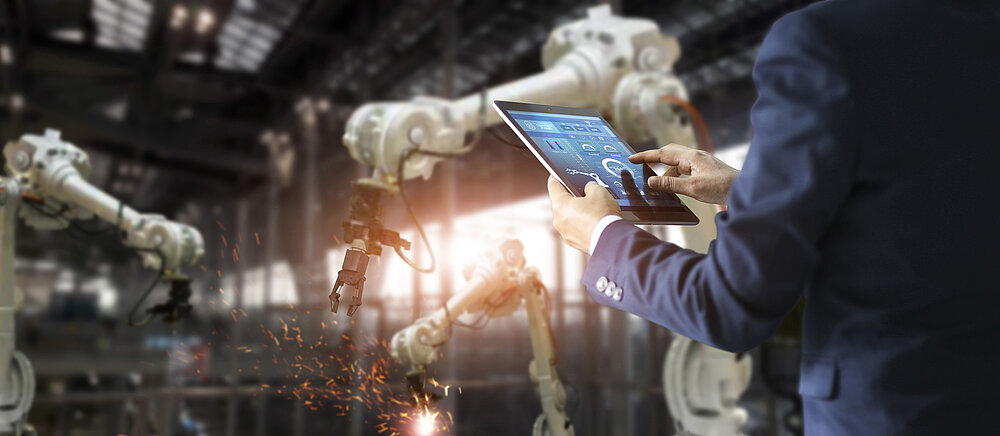The pioneers of AI are revolutionising whole sectors - and have been for some time. While much of the world was revelling in the screened silkiness of KITT in Knight Rider, the cold logic of Hal-9000 in 2001 and Kevin Spacey's comical spybot GERTY in Moon, boffins at the German Reserach Centre for Artifial Intelligence (DFKI) have been working together since the 1980s to teach machines how to think. At more than 900 employees, DFKI is the world's largest research centre in the field and the shareholders are a who's who of tech giants: Microsoft, Google, Intel and Airbus are all shareholders. But similar research centres are now popping up all over Germany: Max Planck institutes, Fraunhofer Institutes and of course, the Digital Hub in Karlsruhe.
The digital revolution, including, but not limited to, Industry 4.0, autonomous driving, big data, energy efficiency, urban management, retailing and economic activity, has brought AI far beyond just the one research institute in recent years. Research from all angles now focuses on the homogenous question: how can AI make internationally successful German industries, services and products even better?
In November 2018, the German Government made a bold statement of intent to this end, declaring €3bn euros of investment funding available over the coming six years for the answering of this question. Among other things, a part of the funding is to create at least 100 new professors in the field, according to the 80-page government strategic document that accompanied the announcement. The stated aim of the document and strategy: making 'AI made in Germany' a globally recognised stamp of quality.
While research continues to proliferate, take-up of Artificial intelligence in German companies is not growing as exponentially as the quantity of research and technological breakthroughs. This partly down to simple cost - it takes time to get the money together to install a good, robust and secure AI system - and partly down to a lack of practical expertise. And lest we forget, the vast majority of German companies are small-to-medium enterprises: flexible in structure and process, but less able to invest the money necessary to implement technology as yet largely untested outside trialling spheres. This aspect is also something the new government funding is supposed to address.
But the trend is undeniable. PwC's estimate of the boost to the global economy AI could bestow coincides with a forecast 11.3 percent rise in German GDP over the same period, thanks to developments in intelligent technology. The study identifies a large proportion of industries within Germany (healthcare, energy and the auto industry in particular) that will benefit from significant productivity gains by adopting AI applications. It also reckons that the value added to the German economy from the adoption of AI within the same timeframe could be worth €430bn
Where can that value be found? In factories, for example, intelligent machines can now evaluate the data from thousands of sensors to optimise production and improve product quality. Meanwhile, business and scientists are testing the use of collaborative AI robots and linking augmented reality technology to AI-based production planning systems. In the automotive industry, global groups are all investing heavily in AI-controlled factories, while AI-based solutions for assisted and autonomous driving, operating systems, entertainment systems and navigation.
The German energy market, featuring an ever-more decentralised system of energy supply from ever-increasing numbers of sources, require smarter, AI-based solutions to manage the new complexities. In medicine, artificial intelligence bots can now filter patients and optimise medical procedures, while others can monitor operations.
The government strategy referred to above is due to be reviewed in 2020. Right now, that process is still to be carried out by human beings. But who would bet that by the end of the period considered in PwC's estimate there will be no AI-based solution proposing a strategy for its own improvement?



